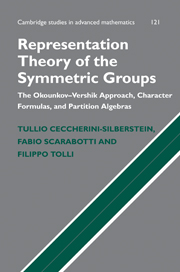 Representation Theory of the Symmetric Groups
Representation Theory of the Symmetric Groups Book contents
- Frontmatter
- Contents
- Preface
- 1 Representation theory of finite groups
- 2 The theory of Gelfand–Tsetlin bases
- 3 The Okounkov–Vershik approach
- 4 Symmetric functions
- 5 Content evaluation and character theory of the symmetric group
- 6 Radon transforms, Specht modules and the Littlewood–Richardson rule
- 7 Finite dimensional *–algebras
- 8 Schur–Weyl dualities and the partition algebra
- References
- Index
7 - Finite dimensional *–algebras
Published online by Cambridge University Press: 05 March 2013
- Frontmatter
- Contents
- Preface
- 1 Representation theory of finite groups
- 2 The theory of Gelfand–Tsetlin bases
- 3 The Okounkov–Vershik approach
- 4 Symmetric functions
- 5 Content evaluation and character theory of the symmetric group
- 6 Radon transforms, Specht modules and the Littlewood–Richardson rule
- 7 Finite dimensional *–algebras
- 8 Schur–Weyl dualities and the partition algebra
- References
- Index
Summary
In the present chapter we give an exposition on finite dimensional semisimple algebras over ℂ and their representation theory. We need the representation theory of finite dimensional algebras mainly to apply it to the commutant of a representation of a finite group. We adopt an anusual approach (inspired by Letac's course [82]): we work with *-closed subalgebras of End(V), where V is a finite dimensional Hermitian vector space, and we call them (finite dimensional) *-algebras. Our approach is concrete and concise; in particular, we do not need any particular knowledge of the theory of associative algebras, of ring theory nor of Wedderburn theory. In addition to the above mentioned notes by G. Letac, our treatment is inspired by the monographs by Shilov [110], by Goodman and Wallach [49], the lecture notes by A. Ram [106], the course by Clerc [21] and the book by Goodman, de la Harpe and Jones [48]. More algebraic expositions may be found in the books by Lang [76], Alperin and Bell [3] and Procesi [103]. An elementary book entirely devoted to finite dimensional algebras is Farenick's [36].
Finite dimensional algebras of operators
Finite dimensional *-algebras
Let V be a finite dimensional vector space over ℂ endowed with a scalar product 〈·, ·〉. We denote by End(V) the algebra of all linear operators T : V → V .
- Type
- Chapter
- Information
- Representation Theory of the Symmetric GroupsThe Okounkov-Vershik Approach, Character Formulas, and Partition Algebras, pp. 314 - 356Publisher: Cambridge University PressPrint publication year: 2010


